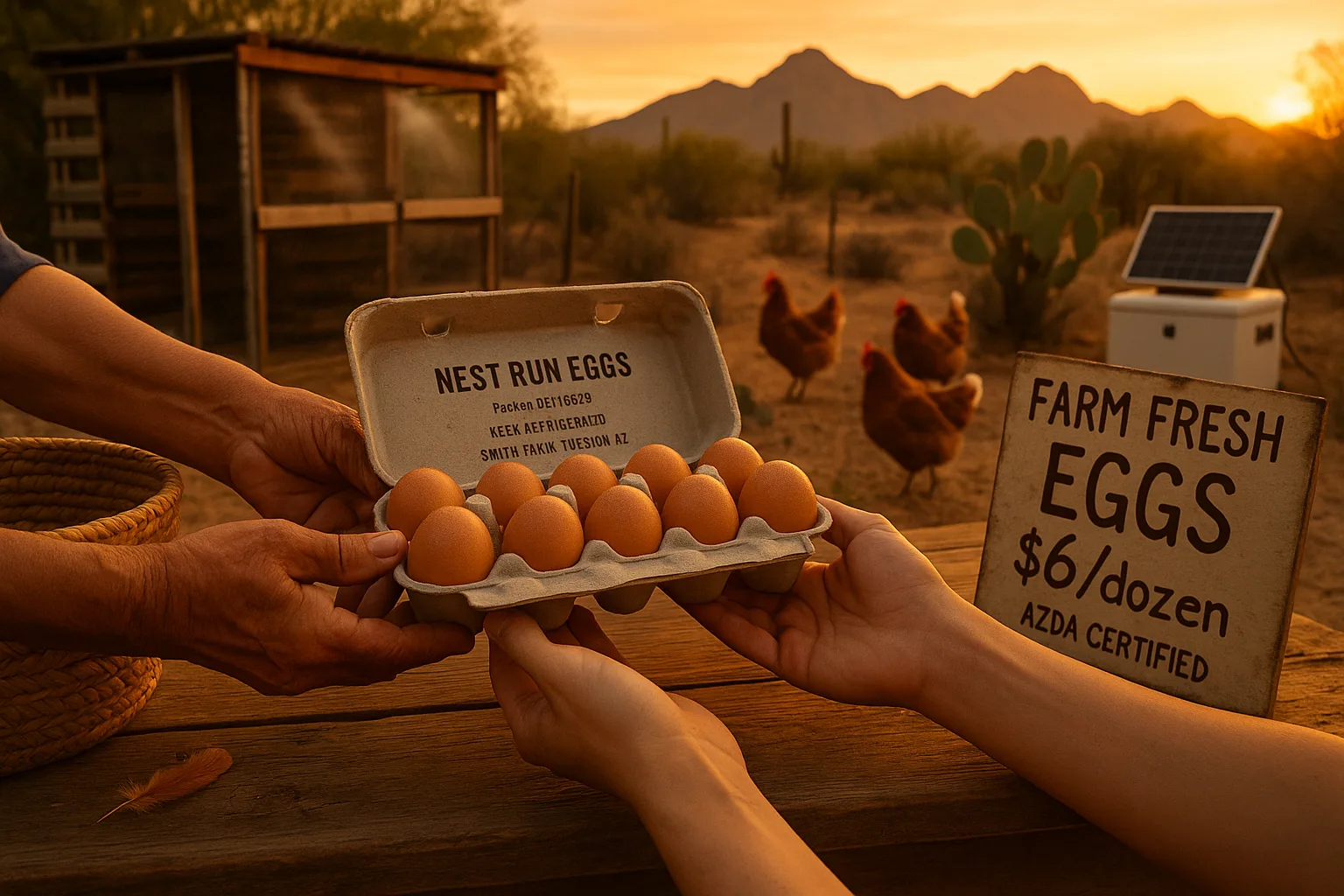The Ultimate Guide to Selling Farm Fresh Eggs in Arizona (2025): Laws, Profits & Sustainable Practices

Arizona’s urban farming movement has transformed backyard chicken-keeping from a hobby into a viable income stream. With consumers paying $4–$7/dozen for truly farm-fresh eggs—double the price of commercial brands—the incentive is clear. But recent legal shifts and avian flu outbreaks make compliance more critical than ever. This 2025 guide demystifies Arizona’s regulatory landscape and provides actionable steps to build a profitable, ethical egg business.
1. Arizona’s Legal Framework: 2025 Updates
Key Legislation
- HB 2325 (2025): Protects your right to keep hens in residential zones but mandates:
- No roosters (noise control)
- Coop setbacks: Minimum 20 feet from neighboring homes
- Manure management: Waste removal twice weekly
- Cage-Free Law Delays: Originally set for 2025, enforcement is now postponed to 2032 due to avian flu impacts. Backyard sellers (<3,000 hens) remain fully exempt .
“During crises like avian flu, we must prioritize both animal welfare and affordable food,” stated Governor Hobbs when announcing the delay .
Exemptions for Small Producers
- Under 3,000 hens: Exempt from commercial cage-free mandates and formal grading .
- “Nest Run” status: Allows sales of ungraded eggs (max 750 dozen/year) without USDA certification .
2. Local Zoning & HOA Rules
Arizona delegates poultry regulations to cities and HOAs. Critical variations:
Table: Backyard Chicken Rules in Major AZ Cities
| City | Max Hens | Coop Setbacks | Sales Restrictions |
|---|---|---|---|
| Phoenix | 6 (<0.5 acre) | 20 ft from property lines | No front-yard sales; HOA rules override |
| Tucson | No limit | Based on lot size | Most urban-ag friendly |
| Chandler | 5 | 5 ft from property lines | Permit needed for coops >120 sq ft |
| Scottsdale | Varies by zone | Strict distance rules | Verify zoning first |
Pro Tips:
- Neighbor waivers: Phoenix allows reduced setbacks with written consent .
- HOAs: Can ban chickens even if city allows them—review covenants first.
- Sales locations: Restricted to residential properties; roadside stands require commercial zoning .
3. Step-by-Step Compliance Checklist
A. Permits & Registration
- Nest Run Registration:
- File a free one-page form with AZ Dept. of Agriculture .
- Allows sales of ≤750 dozen/year (unwashed/unsized) .
- Food Establishment License:
- Required if selling at farmers’ markets ($100–$300/year) .
B. Labeling Requirements (Per HB 2750)
Every carton must display:
- “Nest Run” designation (if ungraded)
- Packaging date (month/day/year)
- Producer’s name/address
- Statement: “Produced in compliance with AZ egg safety standards”
- Safe handling instructions: “Keep refrigerated; cook thoroughly”
Pro Tip: Use waterproof labels—smudged ink violates regulations .
C. Health & Safety Protocols
- Refrigeration: Cool eggs to ≤40°F within 4 hours of collection .
- Storage: Use sanitized containers; never reuse commercial cartons .
- Coop hygiene:
- Minimum 1.5 sq ft/hen space
- Clean manure twice weekly
- Disease prevention: Isolate new birds 30 days; report sick birds to AZ Dept. of Ag: (602) 542-4373 .
4. Profitability & Market Strategies
Financial Realities
- Revenue: $4–$7/dozen vs. $2.50–$4 for commercial
- Costs (10-hen flock):
- Feed: $25–$40/month
- Insulated coop (essential for desert heat): $300–$1,500
- Liability insurance: $500–$1,000/year
Example: A Gilbert seller with 12 hens nets ~$200/month selling 45 dozen at $5/dozen .
Sales Channels
- Farmers markets: Require vendor permits but offer premium pricing.
- Neighborhood apps: NextDoor/Facebook groups tap hyper-local demand.
- CSA subscriptions: Charge upfront for weekly egg deliveries.
5. Liability & Risk Management
- Product liability insurance: Covers illness claims (~$500/year) .
- Homeowner policy riders: Essential for business activities .
- Record keeping: Maintain for 2 years:
- Sales logs
- Sanitation/refrigeration records
- Penalties: $100–$500 fines per violation for labeling/refrigeration breaches .
6. Bird Flu (HPAI) Crisis: 2025 Action Plan
Arizona lost 1.15 million commercial hens to avian flu in 2024–2025 . Protect your flock:
- Biosecurity measures:
- Limit coop access
- Change clothes/shoes after visiting feed stores
- Install footbaths with disinfectant
- Supply chain opportunity: Commercial shortages boost demand—but prioritize flock health over profits .
7. Sustainability & Ethical Branding
Stand out with eco-conscious practices:
- Rescue “spent” hens: Source from commercial farms upgrading flocks.
- Compost manure: Offer fertilizer to gardening customers.
- Heat mitigation:
- Plant mesquite/palo verde trees for shade
- Use swamp coolers; choose heat-hardy breeds (Leghorns, Rhode Island Reds) .
- Recycled materials: Build coops from repurposed pallets.
Final Checklist: Launch Your Egg Business
- Confirm zoning/HOA rules
- Register as “Nest Run” producer (AZ Dept. of Agriculture)
- Design compliant labels (include date, address, safety statement)
- Install dedicated egg refrigerator (maintain ≤40°F)
- Obtain liability insurance (e.g., Farm Bureau)
- Track sales (stay under 750 dozen/year)
Resources:
- AZ Nest Run Registration Form
- AZDA Registration forms
- Backyard Chicken Coop Designs for Desert Climates
- Avian Flu Outbreak Tracker
With Arizona’s laws favoring small producers, your backyard can become a community food hub. As one Tucson seller notes: “My customers taste the difference—they’ll never buy store eggs again.”
